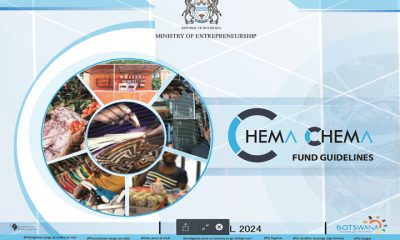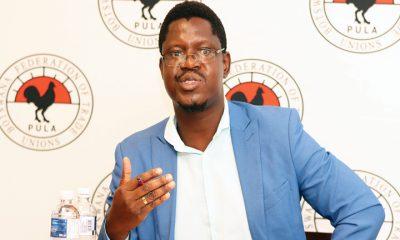Police torture: UN told of electric shock and suffocation
Suspects detained by Botswana Police Services have recounted harrowing stories of abuse and torture at the hands of police officers to the United Nations Working Group on arbitrary detention.
In its preliminary report released after completion of its working visit to Botswana, the Group revealed that it received testimonies about the police using excessive force, including beatings, electrocution, and suffocation of suspects to extract confessions.
[ihc-hide-content ihc_mb_type=”show” ihc_mb_who=”1,2,3″ ihc_mb_template=”1″ ]“When the suspects would raise this with the magistrates, medical examinations would be ordered but often not carried out and the consideration of cases would proceed,” the Group said.
The Group recalled“that any such treatment may amount to torture and ill-treatment absolutely prohibited in international law and also lead to arbitrary detention.”
It said judicial authorities must ensure that the Government has met its obligation of demonstrating that confessions were given without coercion, including through any direct or indirect physical or undue psychological pressure.
“Judges should consider inadmissible any statement obtained through torture or ill-treatment and should order prompt and effective investigations into such allegations,” the Group said. The Group called on the Government to consider the Principles on Effective Interviewing for Investigations and Information Gathering to assist the work of its law enforcement agencies by eliminating confessions as cornerstone of the investigative process and thus guarding against arbitrary detention.
The Group also learned of undue delays of trials usually rooted in the insufficient number of court reporters producing proceeding records and the frequent adjournment and rescheduling of trials due to failure of the legal defence or even the magistrates to appear. “It can take up to two years to produce records, creating significant delays especially for the appellate proceedings,” the Group said.
It saidwhile the authorities recognize this serious problem, with some 2000 cases backlog reported, and the Court Registrar is taking steps to train additional court reporters, delays may result in arbitrary detention and prejudice the right to appeal.
The Group also revealed that it received numerous testimonies about the failure of lawyers to appear at court hearings without a legitimate reason, causing the frequent adjournment of cases, especially in cases when the lawyer is a state-appointed attorney. Similar instances are reported in relation to judges.
“The Group considers that such undue delays are a significant factor contributing to excessive pre-trial detention and recalls that everyone has the right to expeditious trial under article 14 of the Covenant,” the report says.
The Group also met individuals detained due to their inability to repay a debt, which is often not a large sum of money. Additionally, the Group said, to the debt that they have failed to pay, these individuals are liable for Sheriff’s costs, which in many cases doubles or even triples the owed amount.
“Although imprisonment is not lengthy, usually of three months, they are detained together with other prisoners and required to repay the debt, including the Sheriff’s costs upon release,” the report says.
The Group says it considers that detention due to inability to pay debt is arbitrary in itself and because it discriminates against individuals due to their economic status. It called on the Government to urgently review the system and ensure that individuals are not imprisoned due to inability to repay debt.
The Group also expressed concern about vague offences that may lead to imprisonment under the current legislation of Botswana, such as “common nuisance”, “idle and disorderly persons”, “use of insulting language” and “rogues and vagabonds”.
It says these offenses are treated as matters of criminal law and therefore anyone, including children, can be found guilty of such crimes, with penalties ranging from a fine or one month imprisonment or both for first offenders, to up to a year of imprisonment for repeat offenders. The Group was informed that, in the context of Covid-19 legislation, failure to wear a facemask may result in imprisonment.
The Group met individuals imprisoned for these offences and observed these provisions applied against individuals in situations of vulnerability such as vagrants, and used against children considered to be unruly. “These provisions are also used against those who have spoken against various Government policies and/or authorities and used to curb legitimate debate in a democratic society,” the report says.
The Group noted the widespread application of the Stock Theft (Amendment) Act No. 7 of 2019, which imposes a minimum mandatory sentence of 5 years for first offenders and 7 years for repeat offenders, without distinction between adults and children. The Group noted numerous cases of children as young as 15 being sentenced to 5 years of prison under this Act.
The Group said the mandatory minimum sentencing deprives judicial authorities of their duty to assess the proportionality of sentences to individual circumstances in each case. It called on the Government to review its Penal Code to significantly reduce offences punishable by deprivation of liberty, bearing in mind necessity and proportionality.
“Sentences of those imprisoned should be reviewed to determine whether they remain proportionate,” the Group said. The Working Group is also seriously concerned about numerous provisions in Botswana legislation imposing criminal sanctions for offences arising from mere peaceful exercise of rights protected by the Covenant, especially freedoms of expression, assembly and association.
Thus, the report says, the Penal Code criminalises defamation, the Cybercrime and Computer Related Crimes Act, No 18 of 2018 allows for imprisonment of up to one year for “offensive electronic communication”, and the Emergency Powers (Covid-19) Regulations of 2020 penalized “publishing with the intention to deceive” with up to five years imprisonment.
Another Act that the Group expressed misgivings about is the Public Order Act No 6 of 1967 requires prior permission from the police for any public meeting or gathering. It noted that failure to obtain such a permission may lead to a fine or up to six months imprisonment or both.
Finally, the Group noted that the Media Practitioners Act, No 29 of 2008 requires all media workers and outlets to register, including websites and blogs. Failure to register leads to a fine or up to three years imprisonment or both.
“These provisions may have a chilling effect on freedom of expression and especially on journalistic freedom in Botswana. The Group recalls that laws formulated in vague and broad terms breach the principle of lex certa, violating due process of law,” said the UN Group.
It says the principle of legality requires that laws be formulated with sufficient precision so that individuals may have access to and understand the law, and regulate their conduct accordingly.
The Group recalled that laws that are vaguely and broadly worded may deter the exercise of the rights to freedoms of opinion, expression, peaceful assembly and association, participation in political and public affairs, as they have the potential for abuse, including the arbitrary deprivation of liberty.[/ihc-hide-content]
News
Nigerians, Zimbabweans apply for Chema Chema Fund

Fronting activities, where locals are used as a front for foreign-owned businesses, have been a long-standing issue in Botswana. These activities not only undermine the government’s efforts to promote local businesses but also deprive Batswana of opportunities for economic empowerment, officials say. The Ministry of Trade and Industry has warned of heavy penalties for those involved in fronting activities especially in relation to the latest popular government initiative dubbed Chema Chema.
According to the Ministry, the Industrial Development Act of 2019 clearly outlines the consequences of engaging in fronting activities. The fines of up to P50,000 for first-time offenders and P20,000 plus a two-year jail term for repeat offenders send a strong message that the government is serious about cracking down on this illegal practice. These penalties are meant to deter individuals from participating in fronting activities and to protect the integrity of local industries.
“It is disheartening to hear reports of collaboration between foreigners and locals to exploit government initiatives such as the Chema Chema Fund. This fund, administered by CEDA and LEA, is meant to support informal traders and low-income earners in Botswana. However, when fronting activities come into play, the intended beneficiaries are sidelined, and the funds are misused for personal gain.” It has been discovered that foreign nationals predominantly of Zimbabwean and Nigerian origin use unsuspecting Batswana to attempt to access the Chema Chema Fund. It is understood that they approach these Batswana under the guise of drafting business plans for them or simply coming up with ‘bankable business ideas that qualify for Chema Chema.’
Observers say the Chema Chema Fund has the potential to uplift the lives of many Batswana who are struggling to make ends meet. They argue that it is crucial that these funds are used for their intended purpose and not siphoned off through illegal activities such as fronting. The Ministry says the warning it issued serves as a reminder to all stakeholders involved in the administration of these funds to ensure transparency and accountability in their disbursement.
One local commentator said it is important to highlight the impact of fronting activities on the local economy and the livelihoods of Batswana. He said by using locals as a front for foreign-owned businesses, opportunities for local entrepreneurs are stifled, and the economic empowerment of Batswana is hindered. The Ministry’s warning of heavy penalties is a call to action for all stakeholders to work together to eliminate fronting activities and promote a level playing field for local businesses.
Meanwhile, the Ministry of Trade and Industry’s warning of heavy penalties for fronting activities is a necessary step to protect the integrity of local industries and promote economic empowerment for Batswana. “It is imperative that all stakeholders comply with regulations and work towards a transparent and accountable business environment. By upholding the law and cracking down on illegal activities, we can ensure a fair and prosperous future for all Batswana.”
News
Merck Foundation and African First Ladies mark World Health Day 2024

Merck Foundation, the philanthropic arm of Merck KGaA Germany marks “World Health Day” 2024 together with Africa’s First Ladies who are also Ambassadors of MerckFoundation “More Than a Mother” Campaign through their Scholarship and Capacity Building Program. Senator, Dr. Rasha Kelej, CEO of Merck Foundation emphasized, “At Merck Foundation, we mark World Health Day every single day of the year over the past 12 years, by building healthcare capacity and transforming patient care across Africa, Asia and beyond.
I am proud to share that Merck Foundation has provided over 1740 scholarships to aspiring young doctors from 52 countries, in 44 critical and underserved medical specialties such as Oncology, Diabetes, Preventative Cardiovascular Medicine, Endocrinology, Sexual and Reproductive Medicine, Acute Medicine, Respiratory Medicine, Embryology & Fertility specialty, Gastroenterology, Dermatology, Psychiatry, Emergency and Resuscitation Medicine, Critical Care, Pediatric Emergency Medicine, Neonatal Medicine, Advanced Surgical Practice, Pain Management, General Surgery, Clinical Microbiology and infectious diseases, Internal Medicine, Trauma & Orthopedics, Neurosurgery, Neurology, Cardiology, Stroke Medicine, Care of the Older Person, Family Medicine, Pediatrics and Child Health, Obesity & Weight Management, Women’s Health, Biotechnology in ART and many more”.
As per the available data, Africa has only 34.6% of the required doctors, nurses, and midwives. It is projected that by 2030, Africa would need additional 6.1 million doctors, nurses, and midwives*. “For Example, before the start of the Merck Foundation programs in 2012; there was not a single Oncologist, Fertility or Reproductive care specialists, Diabetologist, Respiratory or ICU specialist in many countries such as The Gambia, Liberia, Sierra Leone, Central African Republic, Guinea, Burundi, Niger, Chad, Ethiopia, Namibia among others. We are certainly creating historic legacy in Africa, and also beyond. Together with our partners like Africa’s First Ladies, Ministries of Health, Gender, Education and Communication, we are impacting the lives of people in the most disadvantaged communities in Africa and beyond.”, added Senator Dr. Kelej. Merck Foundation works closely with their Ambassadors, the African First Ladies and local partners such as; Ministries of Health, Education, Information & Communication, Gender, Academia, Research Institutions, Media and Art in building healthcare capacity and addressing health, social & economic challenges in developing countries and under-served communities. “I strongly believe that training healthcare providers and building professional healthcare capacity is the right strategy to improve access to equitable and quality at health care in Africa.
Therefore, I am happy to announce the Call for Applications for 2024 Scholarships for young doctors with special focus on female doctors for our online one-year diploma and two year master degree in 44 critical and underserved medical specialties, which includes both Online Diploma programs and On-Site Fellowship and clinical training programs. The applications are invited through the Office of our Ambassadors and long-term partners, The First Ladies of Africa and Ministry of Health of each country.” shared Dr . Kelej. “Our aim is to improve the overall health and wellbeing of people by building healthcare capacity across Africa, Asia and other developing countries. We are strongly committed to transforming patientcare landscape through our scholarships program”, concluded Senator Kelej.
News
Interpol fugitive escapes from Botswana

John Isaak Ndovi, a Tanzanian national embroiled in controversy and pursued under a red notice by the International Criminal Police Organization (Interpol), has mysteriously vanished, bypassing a scheduled bail hearing at the Extension 2 Magistrate Court in Gaborone. Previously apprehended by Botswana law enforcement at the Tlokweng border post several months earlier, his escape has ignited serious concerns.
Accused of pilfering assets worth in excess of P1 million, an amount translating to roughly 30,000 Omani Riyals, Ndovi has become a figure of paramount interest, especially to the authorities in the Sultanate of Oman, nestled in the far reaches of Asia.
The unsettling news of his disappearance surfaced following his failure to present himself at the Extension 2 Magistrate Court the preceding week. Speculation abounds that Ndovi may have sought refuge in South Africa in a bid to elude capture, prompting a widespread mobilization of law enforcement agencies to ascertain his current location.
In an official communiqué, Detective Senior Assistant Police Commissioner Selebatso Mokgosi of Interpol Gaborone disclosed Ndovi’s apprehension last September at the Tlokweng border, a capture made possible through the vigilant issuance of the Interpol red notice.
At 36, Ndovi is implicated in a case of alleged home invasion in Oman. Despite the non-existence of an extradition treaty between Botswana and Oman, Nomsa Moatswi, the Director of the Directorate of Public Prosecution (DPP), emphasized that the lack of formal extradition agreements does not hinder her office’s ability to entertain extradition requests. She highlighted the adoption of international cooperation norms, advocating for collaboration through the lenses of international comity and reciprocity.
Moatswi disclosed the intensified effort by law enforcement to locate Ndovi following his no-show in court, and pointed to Botswana’s track record of extraditing two international fugitives from France and Zimbabwe in the previous year as evidence of the country’s relentless pursuit of legal integrity.
When probed about the potential implications of Ndovi’s case on Botswana’s forthcoming evaluation by the Financial Action Task Force (FATF), Moatswi reserved her speculations. She acknowledged the criticality of steering clear of blacklisting, suggesting that this singular case is unlikely to feature prominently in the FATF’s assessment criteria.













